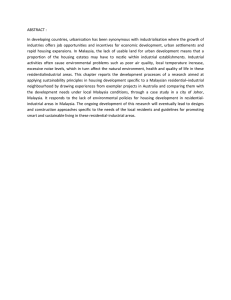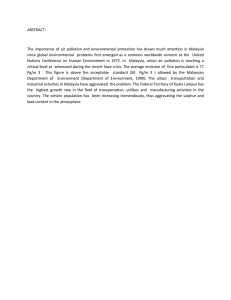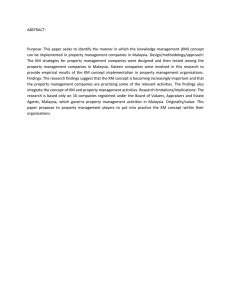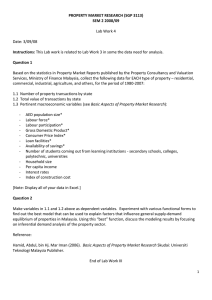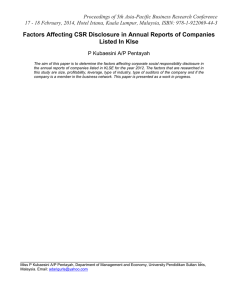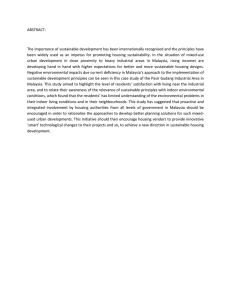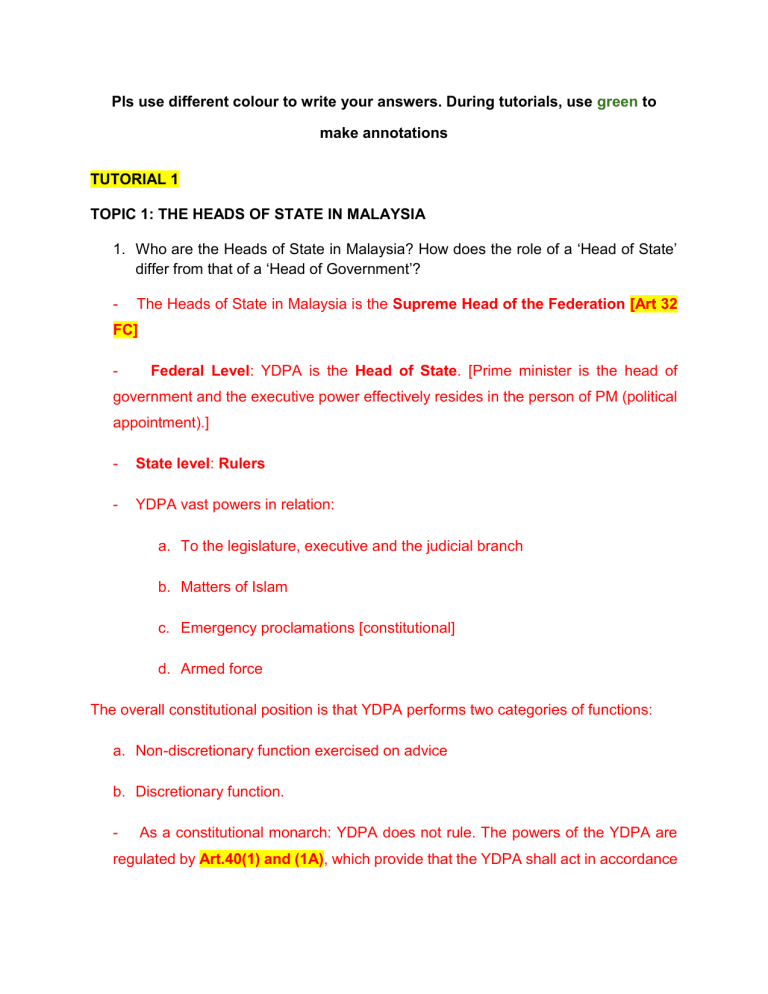
Pls use different colour to write your answers. During tutorials, use green to
make annotations
TUTORIAL 1
TOPIC 1: THE HEADS OF STATE IN MALAYSIA
1. Who are the Heads of State in Malaysia? How does the role of a ‘Head of State’
differ from that of a ‘Head of Government’?
-
The Heads of State in Malaysia is the Supreme Head of the Federation [Art 32
FC]
-
Federal Level: YDPA is the Head of State. [Prime minister is the head of
government and the executive power effectively resides in the person of PM (political
appointment).]
-
State level: Rulers
-
YDPA vast powers in relation:
a. To the legislature, executive and the judicial branch
b. Matters of Islam
c. Emergency proclamations [constitutional]
d. Armed force
The overall constitutional position is that YDPA performs two categories of functions:
a. Non-discretionary function exercised on advice
b. Discretionary function.
-
As a constitutional monarch: YDPA does not rule. The powers of the YDPA are
regulated by Art.40(1) and (1A), which provide that the YDPA shall act in accordance
with the advice of the Cabinet or a Minister acting with Cabinet authority, except where
the Constitution expressly provides otherwise.
-
Art 32(1) – Limited legal immunity
Pm, for YDPA - federal level
Menteri besar for Rules, chief minister and premier (swk only) for governors (YDPN)
- state rulers
Head of govt can be removed by HOS but with constitutional procedures
Datuk Nizar bin Jamaluddin v Datuk Seri Zambry Abdul Kadir
[2010] case:
-
Request for dissolution by MB
-
Art 43(4) – Sultan required N (PH) to resign – did he resign? No, N insisted N had
majority, but Z (BN) proved that Z got majority bcaus Z had people to go in front of
the Sultan to express their support for Z. Z and DPM (then, Najib) went to see
Sultan of Perak with the majority of Assemblyperson but there was no vote in the
Assembly. N went to Sultan request dissolution. Sultan refused, ask N resign, N
refused. Sultan declared position of MB vacant; appointed Z as MB. [para. 44-55 judgment] - vote in assembly is necessary
Head of govt lose majority and refuse resign → sultan declare position vacant
pm
ydpa
Responsible for most day to day
executive actions [even if they carried
out in the name of the Head of State)
personifies/embodies the State
No immunity
Limited legal immunity
Drafting and executing legislation
Gives formal assent to legislation
Rulers (not governors - coz they are
not royal) = Head of Islam Art 3(2, 3,
5)
ceremonial
Appointed and removed by the Head of
State -
Prerogative power
-
Granting pardon
Honors and titles
acreditting diplomats
Constitutional power - proclamation of emergency – discretionary power?
Discretionary powers of YDPA
- Art 40(2)(b): withhold consent to a request for
dissolution - to guard against abusive dissolutions (political instability, genuine lost of
confidence in the head of govt,
-
Art 40(2)(a): Appointment of PM – can the monarch
literally appt anyone he likes? Subjected to Art
43(7) & 43(2)(a)
-
[Art 40(2)(c)] Requisition of a meeting of the
Conference of Rulers concerned solely with
privileges, position, honors and dignities of their
Royal Highnesses, and any action at such a
meeting
{Requisitioning
a
meeting
of
the
Conference of Rulers concerned solely with the
privileges, positions, honours and dignities of the
Rulers}
-
Any other functions specifically mentioned as such
in the Constitution
-
Request any information available to the Cabinet
[Art 40(1)]
Extra: art 141A(2) - in his own discretion, advice of PM, consultation of Conference –
PM’s advice shall prevail – Art 40(1A) [As a constitutional monarch: YDPA does not rule.
The powers of the YDPA are regulated by Art.40(1) and (1A), which provide that the
YDPA shall act in accordance with the advice of the Cabinet or a Minister acting with
Cabinet authority, except where the Constitution expressly provides otherwise.]
Cases:-
Sim Kie Chon v Superintendent of Pudu Prison
-
Karpal Singh v Sultan of Selangor
-
Juraimi bin Husin v Lembaga Pengampunan Pahang
Art 150(2B, 6, 6A) - in State of Emergency, No parliament, any laws can just arise since
no P – eg no mask, fine RM10k – Satisfaction of YDPA = Satisfaction of Cabinet
2. What is the role of the Conference of Rulers in the Malaysian constitutional
system?
✔️ Art 38(2) FC:
Electing YDPA and Timbalan YDPA
Agreeing or disagreeing to the extension of any religious acts,
observances or ceremonies to the Federation as a whole
Consent / withhold consent to any law and giving advice on any
appointment which requires the consultation with the Conference
Appointing members of the Special Court under art 182 clause (1)
Granting pardons [reprieves or respites in the special circumstances
listed in Art.42(12)(b) and (c) FC]
May question the national policy if necessary
Art 38(6):
powers of the members of the Conference
Ø Art 38(4) @ 159(5): Giving or withholding consent to certain laws ✔️
Ø Art 105(1) @ 122B(1): The power to be consulted before certain appointments
are made
Ø Art 38(4): "legislative veto" - affects the powers, privileges etc of the Rulers
Ø Safeguard continuing sovereignty of the Rulers
Ø Art 38(6)(c): Alter in state boundaries
Ø Art 32(3): Can remove the YDPA ✔️ [Election and removal of YDPA]
-
Art 42(12) Pardons process
-
Art 159(5) Constitutional amendments
-
Art 182 Special court appointment
-
Art 38(5) Consult COnference before change in any policy affecting
administrative action under Art 153
-
Art 2 - states involve must agree
The Conference may also deliberate on questions of national policy and any other matter
that it thinks fit. When it is deliberating on questions of national policy, the YDPA, the
Rulers and the Yang diPertua-Yang diPertua Negeri shall be accompanied by the Prime
Minister, the Menteri Besar and the Chief Ministers respectively [Art.38(3)]. In such
deliberations the Rulers shall act in accordance with their ministers’ advice.
3. Walter Bagehot famously remarked that the monarch in the United Kingdom has
“three rights – the right to be consulted, the right to encourage, and the right to
warn.” Compare and contrast the position and influence of the Yang diPertuan Agong under the Federal Constitution with the Monarch of the
United Kingdom
-
UK: Complete legal immunity as sovereign
-
Malaysia: partial immunity
-
UK: Unwritten Constitution
-
Malaysia: Written constitution
-
UK: Purely hereditary
-
Malaysia: rotating monarchy [5 years]
-
UK: Heir apparent
-
Malaysia: Deputy king - Article 33(1)
-
Both are head of the established religion
-
Both are heads of state but not heads of government - take precedence over
everyone else but do not exercise day-to-day executive power
-
Sim Kie Chon v Superintendent of Pudu Prison
-
Karpal Singh v Sultan of Selangor
In the Supreme Court case of Sim Kie Chon v Superintendent of Pudu Prison &
Ors [1985] 2 MLJ 385, Sim Kie Chon commenced legal proceedings to challenge
the decision of the Pardons Board to reject his petition for clemency on the basis
that the Pardons Board had previously commuted the death sentence of Mokhtar
Hashim (a former Minister of Youth and Sports) who was convicted of the murder
of Datuk Mohamad Taha Talib, a former Negri Sembilan State Assemblyman.
In dismissing this contention, the Supreme Court made it clear that it was not
the function of the Pardons Board to commute a death sentence. The role of the
Pardons Board was limited to merely tendering advice to the Yang di-Pertuan
Agong, but it was His Majesty himself who exercised the executive power, which
was one of a high prerogative of mercy.
This principle was applied by the High Court in Karpal Singh v Sultan of
Selangor [1988] 1 MLJ 64, where Karpal Singh had sought a declaration that the
blanket statement made by the Sultan of Selangor that he would not pardon anyone
who had been sentence to death for drug trafficking was in violation of Article 42
of the Federal Constitution. Karpal Singh took the position that the Sultan could
only reject a petition of clemency after considering the advice of the Pardons Board
and applying his mind to the petition before him. In applying Sim Kie Chon, the
High Court held that it was not mandatory for the Sultan to act on the advice of the
Pardons Board.
-
Juraimi bin Husin v Lembaga Pengampunan Pahang
This issue came before the Supreme Court in Superintendent of Pudu Prison &
Ors v Sim Kie Chon [1986] 1 MLJ 494, the second episode of the Sim Kie Chon
saga. The protagonist, Sim Kie Chon, had been convicted on a charge under the
now-repealed Internal Security Act 1960 and sentenced to death by the Kuala
Lumpur High Court (upheld on appeal by the Federal Court). As mentioned above,
the Yang di-Pertuan Agong had rejected Sim’s plea for clemency.
Following the disposal of the initial proceedings initiated by him, Sim instituted
fresh proceedings for, among others, declarations that the decision of the Pardons
Board was void and legally ineffective and that the Pardons Board had acted in
breach of natural justice. The Appellants’ application to set aside the proceedings
as an abuse of the process of the court was dismissed and resulted in the appeal
before the Supreme Court.
In allowing the appeal, the Supreme Court reiterated at the outset the principle
in Sim Kie Chon that the role of the Pardons Board is only advisory in nature and
that the true decision-maker is the Yang di-Pertuan Agong. The Supreme Court
took the view that Sim was attempting to challenge the exercise by the Yang diPertuan Agong of his powers of clemency under Article 42 of the Federal
Constitution. However, this was fatal to his case as Article 32(1) of the Federal
Constitution provided that the Yang di-Pertuan Agong shall not be liable to any
proceedings in any court. It held that the power of the Yang di-Pertuan Agong was
an executive act which was by its very nature not an act that is susceptible or
amenable to judicial review. This was in accordance with the legal principle
enunciated by the apex courts of Australia and England at the time.
This issue came up again before a 5-member bench of the Federal Court in
Juraimi bin Husin v Pardons Board, State of Pahang & Ors [2002] 4 MLJ 529.
Juraimi, together with the infamous shaman, Mona Fandey, and her husband, had
been convicted of the murder of Mazlan Idris, a State Assemblyman in Pahang.
Juraimi was sentenced to death by all three tiers of the Superior Courts. His petition
to the Sultan of Pahang for clemency was subsequently rejected, at which point he
commenced legal proceedings to challenge the constitutionality of the said
rejection.
The matter was referred to the Federal Court to determine certain questions of
law, the primary one of which was whether the decision-making process of the
Sultan of Pahang was justiciable. In this case, the process was challenged on the
basis that there had been an inordinate delay of approximately two years between
the presentation of the clemency petition and the rejection of the same.
Having examined the authorities before it, the Federal Court decisively held that
the prerogative of mercy, which includes the power to grant a royal pardon, was
not susceptible to judicial review because its nature and subject matter was not
amenable to the judicial process. This would include challenges made against the
decision-making process as the attempt to make the process justiciable would
indirectly make the decision itself justiciable.
It is therefore clear that the decision of the Yang di-Pertuan Agong/Ruler/Yang
di-Pertua Negeri on a petition for a royal pardon cannot be reviewed and examined
by the Court. The granting of a royal pardon is solely at the discretion of the Yang
di-Pertuan Agong/Ruler/Yang di-Pertua Negeri.
4. With regard to the case of Datuk Nizar bin Jamaluddin v Datuk Seri Zambry Abdul
Kadir [2010] 2 MLJ 285, and general provisions of the Federal Constitution,
discuss the extent to which (a) the Yang di-Pertuan Agong and (b) the hereditary
Rulers at State level wield discretionary power in their exercise of authority.
Guided discretion
-
Article 40(1),
-
Article 40(2)
i.
ii.
Appointment of the PM
Dissolution of Parliament {Article 40(2)(b) [Discretion in HM's
response to a request for the dissolution of Parliament]}
iii.
Requisitioning of the Conference of Rulers
iv.
Any other case mentioned in the Constitution
Wide discretion
-
Powers as Head of Islam
-
Social/cultural influence of the monarchy as an institution
-
Consider the advice of PM
-
Consult the Conference of Rulers
-
40(1A)
TOPIC 2: THE ELECTORAL SYSTEM IN MALAYSIA
1. On the overall, does the electoral system in Malaysia succeed in representing the
will of the Malaysian people? Give reasons for your answer.
No.
Malaysia uses the simple majority system which does not necessarily reflect the choices
and will of the majority of Malaysians who turn up to vote. The simple majority system
only reflects the will of those who had voted for the winning candidate, regardless of the
percentage supporting the candidate. This would mean that even if the candidate had
won over 15% of the votes, but since no other candidates got more than 15% of the votes,
the 15%-candidate will win. This illustrates that by allowing the 15%-candidate to be
deemed elected, this decision has reflected the mere choices of 15% of voters.
Another reason to say that the electoral system does not succeed in representing the will
of Malaysians is when one would refer to Art 119, clause (3) of FC where it prohibits
persons of unsound mind, is serving a sentence of imprisonment, being convicted of an
offence and sentenced to death of an imprisonment for a term exceeding 12 months. This
implies that many individuals have been deprived of their absolute right to vote. For
example, for crimes in relation to drugs, the least serious punishment would be 2 years
imprisonment for self-administration as under s 15 Dangerous Drugs Act 1952. In
Malaysia, as of 2020, 20643 persons have been arrested for crimes in relation to drugs.
According to art 119 clause (3), more than 20,000 people would have then lost their
’absolute right’ as understood in Harris Mohd Salleh v Ismail Majin (2000).
Yes.
Because only Malaysians can vote. This is seen in Art 119 of the FC. Non-citizens of
Malaysia are not allowed to vote. This would argue that the winning candidate no matter
the percentage is only reflective of the will of citizens, Malaysians.
Fair representation of minorities [representation of ‘orang asli’ - aboriginal
people] - does not reserve quotas for minorities (no requirement in 13th schedule
for such quotas)
- Categories
2. The Election Commission (EC) is a constitutionally-mandated body entrusted with
the conduct and management of elections in Malaysia. In your opinion, are there
adequate safeguards around the independence of the EC in Malaysia? Give
reasons for your answer.
-
Yes.
The members of the EC are appointed by the YDPA after consultation by the Conference
of Rulers, instead of the usual Prime Minister to minimize all political aspects that may
interfere with the decision as per Art 114(2).
Other safeguards would include the permanency of tenure of the Commission members
as guaranteed in Art 114(3) while being subjected to Art 114 clause (4) and (4A).
Art 114(5) and (6) further encourages independence through the salaries of the
members which cannot be altered to their disadvantage.
The EC may also request the help of any government authorities in the conduction of
polls as seen in Art 115.
However, even with such constitutional safeguards, controversies have arisen in the
past. For example, in the Speech At BERSIH People’s Convention by Lim Guan Eng,
LGE has made a statement that the EC is no longer independent when it accepted the
instructions of the government and encouraged people to change their IC but to conduct
their functions as in Art 113. In the speech, LGE also raised his suspicions on the
independence of the EC in the 2004 General Election where many voters could not find
their
names
and
lost
their
right
to
vote.
(https://dapmalaysia.org/english/2007/july07/lge/lge691.htm)
3. Johan is an aspiring politician who has joined the “Love Malaysia Party” and
would like to represent his political party to contest in a general election. Advise
Johan as to:
a. The main types of elections conducted in Malaysia; and
-
federal, state elections
-
direct, indirect elections
-
scheduled / general elections, by-elections
To elect the members of the Dewan Rakyat and to elect the members of the State
Legislative Assemblies
b. The role of political parties in the electoral system in Malaysia
-
A political party is a grouping of individuals who come together to advance a
common political viewpoint or agenda.
In Malaysia, political parties are regulated by the Registrar of Societies (RoS)
and the Election Commission (SPR).
Registration with the SPR allows a political party to “sponsor” candidates at
elections. That is to say, candidates can be recognised as being affiliated with a
political party, being consequently able to use that party’s symbol on promotional
material and on the ballot paper.
4. Would replacing first-past-the-post with a different electoral system produce better
results in the context of Malaysia? Give reasons for your answer.
Advantages and Disadvantages of Simple Majority System:
According to Faruqi (2008), he said that it is a huge challenge to choose which
electoral system is the best to implemented in the country which it later will use to elect
the representative of the government and the parliament as one system might not fit all
country. The present casting a ballot framework rehearsed in Malaysia in choosing the
individuals from the Dewan Rakyat is referred to as the First Past the Post System
(FPTP), FTPT is additionally referred to as a simple majority system in which the winner
takes everything. It implies that the applicant with the biggest number of vote in every
electorate is properly chosen, despite the fact that he/she may not really have gotten the
greater part the vote cast. Hence, we’ll discuss critically the advantages and
disadvantages of the simple majority system. There an advantages and disadvantages
of the simple majority system or have been known as the First Past the Post System
(FPTP). However, the advantages of the Simple Majority System are easy and simple to
work and produce simplicity, produce majority rule, stable and reliable parliamentary
effective and in this way quick to come with the result of the voting while for disadvantages
is can energize the advancement of ideological groups dependent on clan, ethnicity or
locale, avoids smaller parties from 'fair" representation, and avoids minorities from fair
representation.
First of all, one key bit advantage of the simple majority system is because it shows
simplicity. It's because the simple majority system is praised for being easy to utilize and
understand by everyone. This is because the voters only can vote for one party and the
candidates they support and the way to vote is the voters have to tick once only beside
the name or symbol of the candidates and put the ballot paper inside the ballot box. It
takes barely a short time to complete this voting. All that is required is that a 'X' is set in
the box compared to the ideal competitor; a reasonable and unambiguous decision is
offered, causing little voter perplexity. In addition, it also provides simplicity as it’s easy
for the electoral officials to conduct and count the votes as the number of the candidates
on the ballot paper is large. Hence, it will not be dealing with complexity and will make it
easier for everyone. This is contradicting with other systems such Single Transferable
Vote can distance voters because of their complexity, simple majority system is
straightforward and a system that is easy to understand. In this way, voters can connect
all the more effectively in decisions, which may empower a more prominent turnout.
Secondly, by using the Simple Majority System is likely to bring the arrangement
of the strong government. This is on the grounds that it favors larger parties, and can
thus deliver greater part governments notwithstanding when voters might be divided.
Since seats don't have to be won through a majority of the vote, a party may win a majority
of seats even without most of voters' support. Hence, the result of this is governments are
normally composed of a single party (barring the coalition that framed in 2010), and
consequently have a clear strategy and mandate and can execute their strategies and
policies adequately, as is at present being appeared by the Conservative government.
Thirdly, another contention for the Simple Majority System framework is that it
keeps up a connection between a chosen representative and his/her body
electorate, accordingly offering a high level of delegate responsibility. The elected
representative therefore is not only responsible and concerned about their political party
but also responsible and concerned of their local constituents be them in rural or urban
zones. The Simple Majority System is a "single representation" with representation for
state administrative or the parliament dependent on constituents. It also allows the voters
to choose and vote which party they like to rule the country. Hence with this system, it will
build a good relationship between the voters of the constituents and the elected
representative. Therefore, if the elected representative does not do well in doing their job,
the voters may choose another party in the next election.
Lastly, the advantages of a simple majority system are that it is effective and in
this way quick to come with the result of the voting. There is no delay and chosen
individuals and governments can soon set up to form a new government.
Despite the advantages of the simple majority system, there are also
disadvantages regarding this electoral system where the simple majority system is
frequently criticized for a number of reasons. One of its main criticism is the
disadvantages of the simple majority system are that, it can energize the advancement
of ideological groups dependent on clan, ethnicity or locale, which may base their
battles and approach stages on originations that are appealing to most of
individuals in their area or district yet prohibit or are unfriendly to other people. For
example, this has been a continuous issue in African nations like Malawi and Kenya,
where enormous mutual groups will in general be locally focused. The nation is along
these lines isolated into topographically separate party strongholds, with minimal
motivating force for gatherings to make claims outside their home locale and social
political base.
Secondly, criticism regarding the Simple Majority System it’s said to leave a large
number of wasted votes. Why it is said as ‘wasted vote’ is because votes which cannot
go towards the election of any candidates are said as wasted votes. This is said identified
with 'Regional fiefdoms' above is the pervasiveness of wasted votes, when minority party
supporters start to feel that they have no any hope for regularly choosing an electing
candidate of their choice. This can be a specific danger in beginning majority rule
systems, where distance from the political framework improves the probability that
radicals will most likely prepare to mobilize against anti-system movement. This is
because they feel like their voice and choices of the specific candidate was not heard and
hence it can lead to extremist groups.
It avoids smaller parties from 'fair' representation, as in a gathering which
wins roughly, 10 percent of the votes should win around 10 percent of the
authoritative seats. In the 1993 government race in Canada, the Progressive
Conservatives won 16 percent of the votes however just 0.7 percent of the seats, and in
the 1998 general race in Lesotho, the Basotho National Party won 24 percent of the votes
yet just 1 percent of the seats. This is an example which is rehashed time and time under
simple majority system

